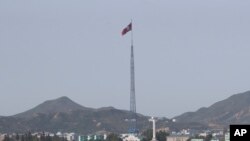South Korea’s spy agency said Tuesday that a senior North Korea diplomat based in Cuba has fled to South Korea, the latest in a series of defections by members of the North’s ruling elite in recent years.
The National Intelligence Service said media reports on the defection of a North Korean counselor of political affairs in Cuba were true. A brief statement by the NIS public affairs office gave no further details.
South Korea’s mass-circulation Chosun Ilbo newspaper reported earlier Tuesday that diplomat Ri Il Kyu fled to South Korea with his wife and children in November.
Chosun Ilbo cited Ri as telling the newspaper in an interview that he had decided to defect because of what he called disillusionment with North Korea’s political system, an unfair job evaluation by Pyongyang's Foreign Ministry, and the ministry's disapproval of his hopes to visit Mexico to treat his neural damage. He said that hospitals in Cuba didn't have the necessary medical equipment to treat his health problem due to international sanctions.
Other South Korean media outlets carried similar reports later Tuesday.
Ri defected before South Korea and Cuba established diplomatic ties in February, an event that experts say likely posed a political blow to North Korea, whose diplomatic footing is largely dependent on a small number of Cold War-era allies like Cuba.
The Chosun report said Ri had been engaged in efforts to block Cuba from opening diplomatic ties with South Korea until his defection. The report said Ri won a commendation from leader Kim Jong Un for his role in negotiations with Panama that led to the release of a ship detained in 2013 for allegedly carrying banned items like missiles and fighter jet parts. The report said Ri was then a third secretary of the North Korean Embassy in Cuba.
The South Korean government says the number of highly educated North Koreans with professional jobs escaping to South Korea has steadily increased in recent years. But it's still unusual for a member of the North’s ruling elite to come to South Korea.
About 34,000 North Koreans have defected to South Korea to avoid economic hardship and political suppression since the end of the 1950-53 Korean War. A majority of them are women from the North’s poorer northern regions who arrived in South Korea since the mid-1990s, when North Korea suffered a devastating famine that was estimated to have killed hundreds of thousands of people.
In 2016, Tae Yongho, then a minister at the North Korean Embassy in London, defected to South Korea. He told reporters in Seoul that he decided to flee because he didn’t want his children to live “miserable” lives in North Korea and he fell into “despair” after watching North Korean leader Kim execute officials and pursue development of nuclear weapons.
North Korea has called him “human scum” and accused him of embezzling government money and committing other crimes. Tae was elected to South Korea’s parliament in 2020.
In 2019, North Korea’s acting ambassador to Italy, Jo Song Gil, arrived in South Korea. Also in 2019, North Korea’s acting ambassador to Kuwait arrived in South Korea with his family. In 2021, lawmakers cited the NIS as telling them the diplomat changed his name to Ryu Hyun-woo after arriving in South Korea.
South Korea’s unification and foreign ministries said they couldn’t confirm reports about Ri’s defection.
The highest-level North Korean to seek asylum in South Korea is Hwang Jang-yop, a senior ruling Workers’ Party official who once tutored Kim Jong Un’s late father, dictator Kim Jong Il. Hwang’s 1997 defection was hailed by many South Koreans as an intelligence bonanza and a sign that the North’s political system was inferior to the South’s. Hwang died in 2010.











